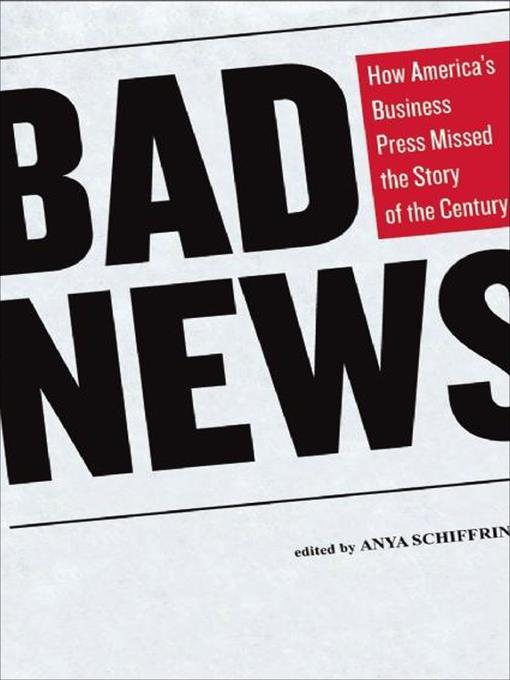
Bad News
How America's Business Press Missed the Story of the Century
کتاب های مرتبط
- اطلاعات
- نقد و بررسی
- دیدگاه کاربران
نقد و بررسی

November 22, 2010
The business press took a sound beating after the economic crisis—both because of what was widely regarded as its failure to accurately anticipate and warn the public of the impending cash, and the implosion of American print journalism as advertising revenue evaporated and the Web poached its readers. Schiffrin, director of the media and communications program at Columbia University's School of International and Public Affairs, assembles contributions from leading journalists and academics, including Nobel laureate Joseph Stiglitz and Peter S. Goodman, national economic correspondent for the New York Times, who engage in soul-searching about why the crisis was not predicted earlier and whether the ensuing coverage was adequate. Though the contributors disagree on whether the media did or did not do its job, all present smart, deeply considered analyses that make for fascinating reading.

November 15, 2010
The story of the century—the 21st, that is—is the ongoing financial crisis that has threatened to bring the developed world to its knees. Why business writers didn't see it coming is the big question this collection of essays seeks to answer.
The collapse that led to the Great Recession came, writes Schiffrin (School of International and Public Affairs/Columbia Univ.), at a perfect-storm time for journalism, when collapsing advertising revenues and "the ensuing layoffs and staff cuts . . . made journalists fear for their jobs and perhaps more afraid to stand out from the rest of the pack." And that was for the journalists who still had jobs, since some 30,000 nationwide had been eliminated, along with entire newspapers and magazines. Despite the generalized sense of guilt and shame about the failure to warn readers about the catastrophe, there was largely nothing to be done about it, since the business media had also become "embedded" inside Wall Street in the same way that war correspondents are embedded inside combat units. In these positions, the journalists were loath to report the unpleasant truths—if they were capable of doing so at all, given that few business reporters have the requisite understanding of economics to give a big-picture view of events by taking inches-thick reports home and reading between the lines to discern such startling revelations as, according to Washington Post writer Dan Froomkin, "the middle class may never be the same again" and "the hugely irresponsible financial sector remains unchastened." Some contributors note external reasons for the failure of the business press, not least the obfuscations and outright lies of Wall Street. In all events, as New York Times writer Peter Goodman writes, it was hard to do deep interpretation and forecasting when "we had our hands full simply trying to make sense of the crush of events unfolding day after day." Other contributors include Joseph Stiglitz and Barry Sussman.
A sort of All the President's Men for our time, and just the thing to lure bright young people into economics graduate programs and journalism school—if only there were jobs waiting on the other end.
(COPYRIGHT (2010) KIRKUS REVIEWS/NIELSEN BUSINESS MEDIA, INC. ALL RIGHTS RESERVED.)

December 1, 2010
As Americans continue to struggle with the current recession, analysts are working to figure out how the economic crisis caught us by surprise. This collection of essays by leading media scholars and journalists examines how the business press mostly missed the coming of the crisis and explores how the media covered the recession as it progressed. Editor Schiffrin (director, media & communications program, Columbia Univ.) and Nobel Prize-winning economist Joseph Stiglitz open the volume with pieces that provide an analytical framework for understanding business journalism. After addressing what caused the failure--from conflicts of interest to lack of economics expertise to a shortage of reporters--the collection highlights some of the coverage that took place and closes with recommendations for strengthening the watchdog function of the press in covering issues of economics. VERDICT While there is some overlap, these well-written pieces provide a good overview of the challenges of covering business and economic news. The collection both critically examines the recent performance of the press and offers suggestions for improving coverage. Of interest to journalists and academics.--Judy Solberg, Seattle Univ. Lib.
Copyright 2010 Library Journal, LLC Used with permission.

























دیدگاه کاربران